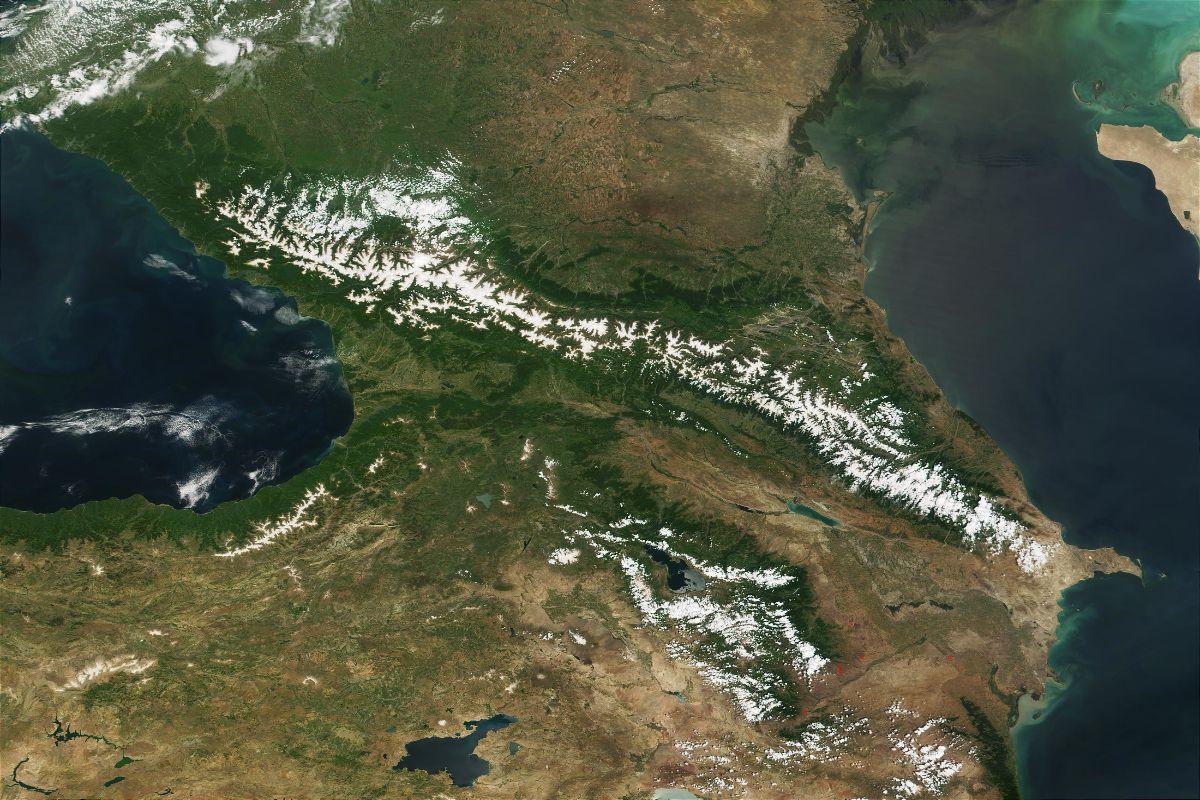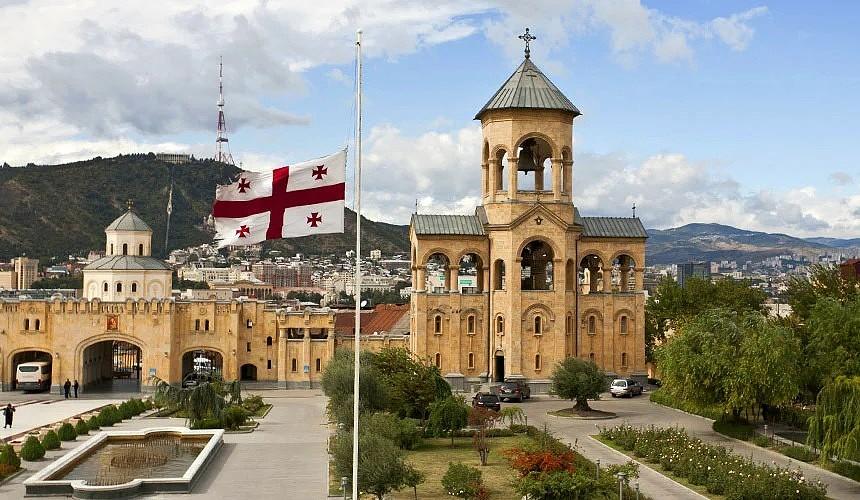Georgia's ambivalent policy as a consequence of war with Russia Ex-minister Gia Nodia hosted by Caliber.Az
The day before Georgia marked the next anniversary of the outbreak of military operations in South Ossetia. Fourteen years after the Russian-Georgian war the country's Foreign Ministry once again appealed to Russia, reminding it of its obligation according to the agreement of 2008 to withdraw its troops from Abkhazia and South Ossetia. As we know, Russia has maintained a military presence in these regions to date, circumventing an important clause in the agreement. Moreover, it has recognized these two regions as "sovereign states." Apart from Russia, Venezuela, Nicaragua, Syria and the island state of Nauru have also joined Russia's decision.
Recall that as a result of the five-day war between Russia and Georgia in August 2008, approximately 850 people were killed. It is also known that the war was stopped by the mediation of the European Union and the personal participation of Nicolas Sarkozy, the then president of the French presidency of the European Union.
Azerbaijan supports the independence, sovereignty, and territorial integrity of neighboring Georgia within its internationally recognized borders. The country is a strategic partner of Azerbaijan in the South Caucasus.
Meanwhile, the aftermath of the five-day Russian-Georgian war has significantly altered the balance of power in the region. Russia, which to this day positions itself as a peacemaker in the South Caucasus, became a direct participant in the conflict in Georgia, and it significantly increased its military presence in the region by deploying military bases in South Ossetia and Abkhazia. As a consequence, diplomatic relations between Georgia and Russia have not been restored to this day.

Drawing parallels between Russia's current war with Ukraine and the Russian-Georgian military conflict of 2008, we can only conclude that Moscow's policy has remained unchanged. If 14 years ago Russia, when intervening in the conflict with Georgia, argued its actions as "coercion of Tbilisi to peace," now it pursues a similar policy under the guise of "denazification and demilitarization" with respect to Ukraine. Curiously, in both cases Moscow justifies its actions by the need to "protect its citizens," but in both Georgia and Ukraine it was the first to use the military factor. Moreover, if earlier Russia indirectly claimed only regional control, today its territorial appetite has increased, as the events in Ukraine have also shown. By declaring a tacit war on the West, Moscow has actually challenged the international community, demonstrating its own geopolitical ambitions in the redivision of the world. Whether Russia, which claims one of the main roles in world domination, will be able to approach this goal is a rhetorical question. However, there is no doubt that it will continue to impose its policy on the most vulnerable countries of the former Soviet Union.
So, it is unlikely that countries aspiring for membership in the EU or NATO will be able to avoid the Ukrainian scenario in the future. Georgia has been facing this problem for a long time, all because, almost from the moment of independence, it is aimed at joining the Western military bloc and hopes for European integration. A while back, Russia categorically did not allow Georgia to turn to the western flank. Suffice it to recall how, even ten years after the conflict, Russian Prime Minister Dmitry Medvedev warned Tbilisi against joining NATO, threatening that otherwise, it could provoke a terrible conflict. He made the statement in a 2018 interview with Kommersant, reminding Tbilisi of the Russian military bases deployed in South Ossetia and Abkhazia. Medvedev's statement was clearly confirmed by two facts. First, Georgia is constantly in the zone of Russia's attention, even despite the formal severance of relations with it. The second is that Russia will not cede its position in the South Caucasus to the West or the US, which also has interests in the region. However, considering the very remote prospect of Georgia's membership in the North Atlantic Alliance, on the one hand, and the disastrous consequences for Ukraine (as a potential candidate for NATO and the EU), on the other hand, it is very doubtful that the current political agenda of Georgia will remain unchanged toward the Western benchmarks.
Gia Nodia, former Minister of Education and Science of Georgia and Head of Caucasus Institute of Peace, Democracy, and Development, shared his opinion with Caliber.Az on whether Georgia is ready to give up the idea of joining NATO in favor of possible rapprochement with Russia in the foreseeable future and in light of the events in Ukraine.
Nodia believes that this issue is still relevant for Georgia.
"According to expert assessments, most Georgians support the dual policy of the Georgian Dream party, which is declaratively aimed at European and North Atlantic integration, but in reality tries to stick to the line that satisfies Russia as much as possible. The reason for such an approach is that the pro-Western orientation dominates the Georgian society, including the large part of the Georgian Dream supporters who vote for it. Therefore, the reaction of Georgian society to an open rejection of Western policies could be very acute. Apparently, this is the main factor that makes the Dream avoid such a step. Partly the reason is that Georgian President Bidzina Ivanishvili has serious economic interests that bind him personally to Russia, as well as his entourage, who are far closer to Russian values than to Western ones. But what exactly the Georgian government is guided by can be interpreted in different ways.

The president of Georgia has limited powers. She is a ceremonial figure who makes statements that contradict the course of the government. Her position is aimed at defending a consistent pro-Western course, but in reality, she is unable to change government policy also because she has no support, including from the opposition, and is unable to mobilize public support in favor of her pro-Western viewpoint. The Russian and Georgian positions have converged to some degree, but it is unlikely that this will happen at a political and diplomatic level in the foreseeable future. Formally, the sides have not restored their relations but there is some convergence of positions," says the former Georgian minister.
According to Nodia, Russia's policy towards the West became even more aggressive which could not but affect countries that have chosen a pro-Western course. Moscow saw a danger for itself because of Western expansion in the world and in the region. The 2008 Russian-Georgian war was the first step in that direction, and a decade and a half later the fighting moved to Ukraine.
"For Georgia, the outcome of the 2008 war is far from clear-cut. First, its territories were occupied, although even before the war they were actually under the Russian protectorate. The idea of restoration of Georgia's territorial integrity has been postponed indefinitely because it means a direct conflict with Russia, which is in no way beneficial for Georgia.
Second, Russia's main goal was not only to consolidate its position in South Ossetia and Abkhazia but also to change Georgia's political course. Moscow did not achieve this because Mikhail Saakashvili's government remained in power. But as a result, after the change of power in the country in 2012, there was a gradual erosion of Georgia's pro-Western course. Now we have reached a point where we cannot unambiguously speak about the pro-Western course of the Georgian government. On the declarative level, this course seems to be preserved, but on the level of actual policy, it is at least ambivalent. There is an opinion in Georgia itself that public support for a pro-Western course will inevitably lead to a war with Russia. It's hard to predict anything now - everything will depend on the consequences of Russia's war in Ukraine and what the security architecture of the region and the world will be," Gia Nodia concluded, adding that the Russian-Georgian conflict did not have any special consequences for the West.








